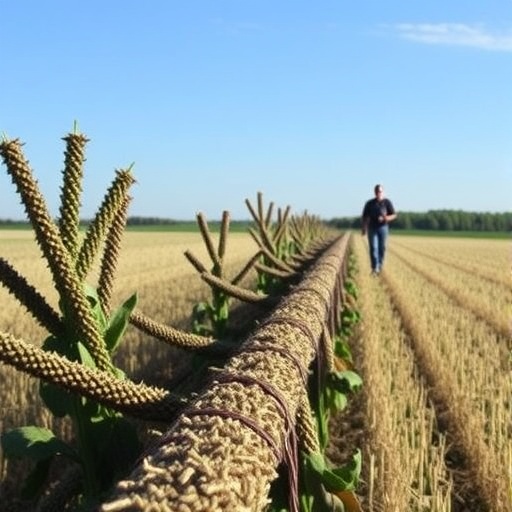In a groundbreaking elucidation on the sustainability of agricultural practices in Ukraine, a new study conducted by Medinets et al. highlights the critical issue of nutrient asymmetry. This phenomenon—a disparity in nutrient flows—is underpinned by an imbalance in the ratios of essential nutrients like nitrogen, phosphorus, and potassium, leading to adverse effects on soil health, crop production, and overall ecological stability in the region. Given the country’s historic reliance on agriculture, understanding these dynamics is crucial for future policymaking and sustainable farming techniques.
The research uncovers that over the past few decades, Ukrainian agriculture has transitioned into a system heavily dependent on artificial fertilizers, which profoundly influences nutrient distribution in soils. This reliance has caused an excess of certain nutrients, such as nitrogen, while simultaneously leading to deficiencies in others, effectively undermining soil structure and fertility. These shifts illustrate a perilous trend that could impact food security and biodiversity, signaling an urgent need for remedial strategies.
Moreover, the scientists emphasize that the context of nutrient asymmetry is not merely a localized issue but is reflective of broader global agricultural practices. With excessive nutrient application being a common scenario in many farming systems around the world, this research provides a crucial intervention point for a re-evaluation of our agricultural paradigms. As nations grapple with the dual challenges of climate change and food provision, Ukraine’s challenges reflect a microcosm of broader agricultural dilemmas faced globally.
Significantly, the study indicates a pressing need for integrated nutrient management approaches that emphasize a balanced application of fertilizers rather than the current disproportionate usage. This holistic perspective acknowledges the interconnectedness of soil, water, and plant health, advocating for a rethinking of agricultural techniques that could restore balance and foster sustainability in Ukrainian agriculture.
With current trends showing a decrease in soil health due to nutrient imbalances, the implications of these findings extend beyond immediate agricultural practices. The long-term effects can reverberate through ecosystems, impacting water quality and availability, as well as contributing to increased greenhouse gas emissions. Thus, addressing nutrient asymmetry is not solely an agricultural challenge but an ecological one that requires multifaceted strategies.
Research also identifies the socio-economic dimensions of this issue, highlighting how smallholder farmers, who often operate with limited resources and knowledge, are particularly vulnerable to the ramifications of nutrient mismanagement. Promoting educational initiatives and accessibility to information on sustainable practices is critical in empowering these farmers to make informed decisions essential for their livelihoods and the environment.
Furthermore, government policies must evolve to support the transition towards sustainable farming practices. This includes incentivizing practices that promote nutrient balance and invest in the necessary research to develop eco-friendly fertilization techniques. By fostering partnerships between scientists, policymakers, and farmers, Ukraine can pioneer a sustainable agricultural model that other nations may look to as a template for confronting similar challenges.
The research’s call to action is not one of revolution, but rather evolution. By incrementally implementing sustainable practices, Ukraine can restore its agricultural integrity, enhancing resilience against external pressures such as climate variability and economic instability. This delicate balance will require unprecedented cooperation and commitment from all stakeholders involved.
As the study progresses, the authors intend to delve deeper into the data concerning regional farming methods and varying climatic conditions to draw more nuanced insights. They aim to develop region-specific recommendations that cater to the distinct challenges faced by farmers in different parts of Ukraine, thereby fostering a tailored approach to sustainable agriculture.
This research holds potential ripples of influence that reach far beyond Ukraine, as it resonates with global audiences concerned about agricultural resilience and sustainability. By putting a spotlight on nutrient asymmetry, the study encourages others in the field to reflect critically on their practices, ensuring that the lessons learned from Ukraine’s experience inform global discussions surrounding food security.
In conclusion, the findings presented by Medinets et al. serve as a clarion call for re-engagement with agronomy—whereby technology and traditional wisdom can converge in pursuit of sustainable agricultural futures. The commitment to resolve nutrient asymmetry could pave the way for innovative farming systems that are kinder to the environment while simultaneously boosting productivity and ensuring food security. As this pivotal research pushes the envelope, it stands as a testament to the critical intersection of science, ecology, and agriculture needed to secure a sustainable future.
With such profound implications stemming from nutrient dynamics, the time for proactive measures is now. Thus, engaging local communities, policymakers, and researchers will become essential in fostering an agricultural revolution rooted in sustainability. The path is undoubtedly complex, but the foundation laid by this research positions Ukraine—and potentially the global agricultural community—toward a resilient agricultural landscape where nutrient balance becomes a standard of practice rather than an aspiration.
Subject of Research: Nutrient asymmetry in Ukrainian agriculture
Article Title: Nutrient asymmetry challenges the sustainability of Ukrainian agriculture
Article References:
Medinets, S., Oenema, O., Spears, B.M. et al. Nutrient asymmetry challenges the sustainability of Ukrainian agriculture.
Commun Earth Environ 6, 845 (2025). https://doi.org/10.1038/s43247-025-02826-9
Image Credits: AI Generated
DOI: https://doi.org/10.1038/s43247-025-02826-9
Keywords: Nutrient asymmetry, Ukrainian agriculture, sustainability, soil health, food security.




